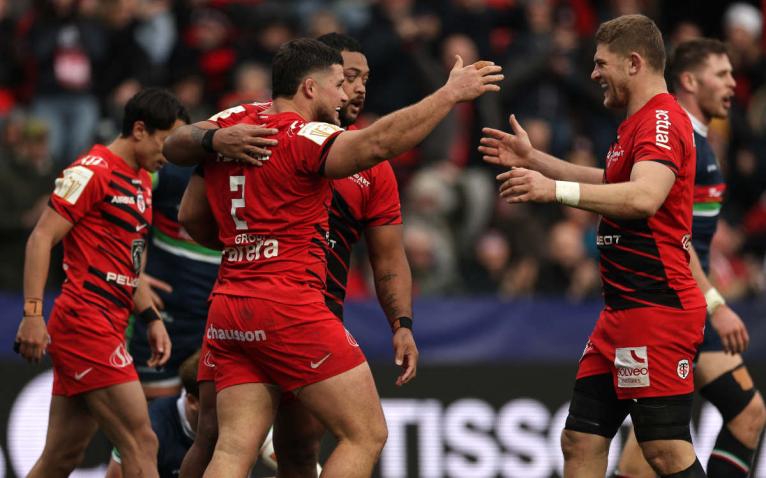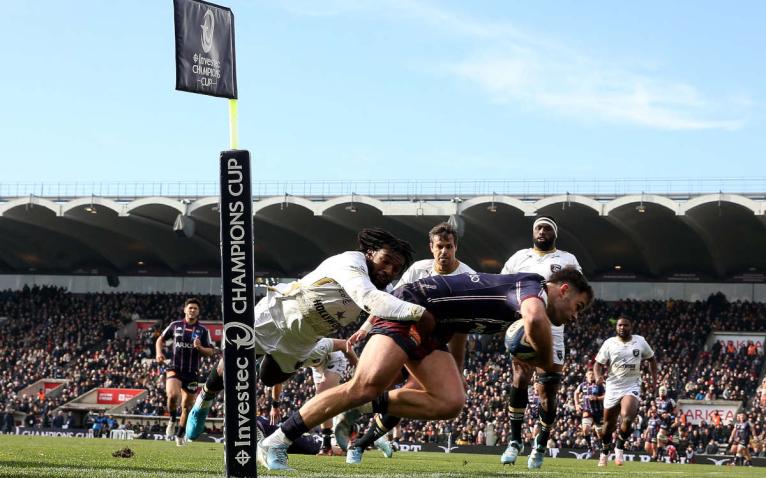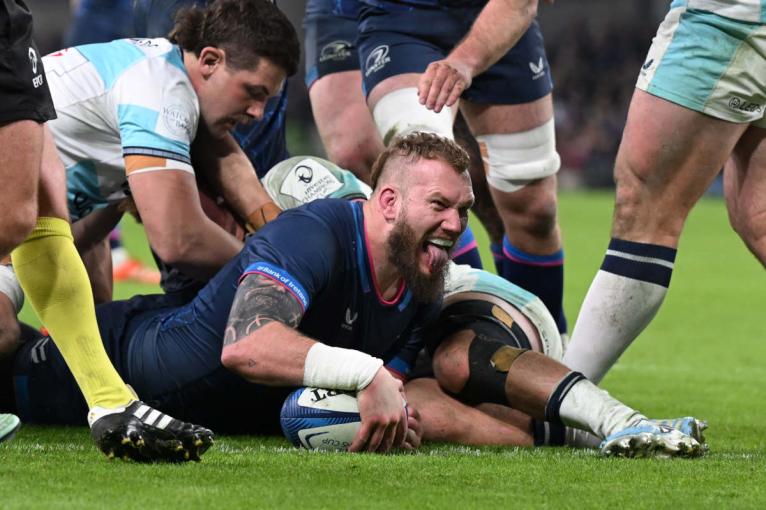
There are two ways to look at the Investec Champions’ Cup: you can see the doughnut or the hole. Opinion is divided, as it usually is. But for the increasingly suspicious hordes who’d been wondering – understandably – whether this season’s competition had any jam in it at all, the final round of pool games finally delivered a melt-in-the-mouth taste explosion: succulent fluff glazed in chocolate sauce and topped with caramelised hazelnuts. I’ll be honest; it could take a week or two for the sugar levels to stabilize.
Northampton Saints vs. Munster was a gift of rubies; ASM Clermont Auvergne and Bristol Bears served up a finale where you needed to leave yourself a ‘Post-It’ note on the coffee table to remember to breathe; Leinster vs. Bath had almost Shakespearean overtones; and Benetton Rugby’s blood-and-guts beating of the mighty Stade Rochelais was a Virgilian epic, the first time an Italian side has made it into the knockout stages of Europe’s premier pot. Indeed, they were denied a home tie in the Champions’ Cup based solely on point differential.
Then there was Sunday. Castres Olympique, once a byword for European apathy, stiffed Saracens on their own turf – with their second string – to reach the top of the competition for the first time in 23 years, while Sale Sharks, needing nothing less than a bonus point victory over the previously unbeaten RC Toulon, gloriously delivered, their elation doubtless tempered by the knowledge that they’re now heading to Stade Toulousain. They won the lottery and received sixpence, but it was a spectacular, sod-you, Sanderson performance.

Certainly, it was a memorable weekend; the most obvious takeaway is that when this competition pits teams of similar merit against each other and inserts the hot breath of risk, it can legitimately claim to be one of the oval earth’s most visually appealing tournaments. However, in its current format, it frequently fails to do so.
Consider the last sixteen, where we’re almost certain to return to the hole in a stale doughnut. Why? Because the eight clubs who will go the road in early April – Ulster, Harlequins, Clermont Auvergne, Saracens, Sale Sharks, Benetton Rugby, Leicester Tigers, and Munster – combined for just one away win in the pool stages, that of Saracens at the hapless Stade Francais. Never say never, but form guides are created for a purpose.
If form and home advantage holds, the quarter finals – most likely – will be a serving of UBB/Stade Rochelais – a drool of an Atlantic derby – Leinster/Glasgow Warriors – intriguing – Northampton Saints/Castres Olympique – hello, again – and RCToulon/Stade Toulousain – rouge et noir contre rouge et noir.
Certainly, it was a memorable weekend; the most obvious takeaway is that when this competition pits teams of similar merit against each other and inserts the hot breath of risk, it can legitimately claim to be one of the oval earth’s most visually appealing tournaments. However, in its current format, it frequently fails to do so.
Consider the last sixteen, where we’re almost certain to return to the hole in a stale doughnut. Why? Because the eight clubs who will go the road in early April – Ulster, Harlequins, Clermont Auvergne, Saracens, Sale Sharks, Benetton Rugby, Leicester Tigers, and Munster – combined for just one away win in the pool stages, that of Saracens at the hapless Stade Francais. Never say never, but form guides are created for a purpose.

But, in the present, what lessons can we draw from the pool stages, when, somewhat ludicrously, after 48 matches, we’ve only narrowed the field from 24 contenders to 16? Furthermore, while those matchups averaged nearly one try bonus point each, we only had 10 losing bonus points and an average points differential of +21 each match. I’m not convinced this is cordon bleu stuff.
League by league, six have advanced from the Top 14 (five with home ties in the round of 16); five from the URC (two with home games); and five from the Guinness Premiership (just one home game). Leaving Paris aside, it doesn’t take a genius to see where the power is.
Compare that to the South African sides, who all fell out; none won on the road, and none even received a losing bonus point. The Bulls lost by 49 points in Castres, the Stormers fell 50+ points short against Harlequins, and the Sharks lost by 50 and 60 points, respectively, in Leicester and Bordeaux. Each won only one home game, and none earned more than five match points out of a potential twenty. Given the world-class talent of the South African players participating, this is a disrespect to the competition. With the finest will in the world, shape up or ship away.
The shining English light appears to be Northampton Saints who, despite being the third worst team in Guinness Premiership, topped their log and will be at home in the next two rounds.
The English, too, will be healing angry wounds. The Roosters won the Guinness Premiership, while Bath and Bristol Bears were both eliminated from the Champions’ Cup; Bath’s only saving grace is that the Challenge Cup remains open. Exeter Chiefs’ 39-21 defeat to the Stormers in the first round proved to be their best result of a disastrous season; this from previous year’s quarterfinalists. Harlequins and Leicester Tigers both went missing in France – the Tigers’ thrashing at Stade Toulousain was hide-your-bootlaces stuff – while Saracens’ collapse last weekend changed a certain home quarterfinal against Benetton Rugby into a journey to RCToulon. It has been a harsh reality check.
The shining English light appears to be Northampton Saints, who, despite being the third weakest team in the Guinness Premiership, have topped their log and will play their next two matches home. Nonetheless, their one pool loss came at the weakest of the French challengers, Stade Francais, where the Saints were 20 points up in even time. If they had hammered down the lid, they would have beaten Leinster to the Golden Ticket of second seed and home advantage in the final. Currently, their route to Cardiff passes through Dublin. Even the good news is laced with remorse.

So, what about the key contenders? Union Bordeaux-Bègles approached the pool stages like a sniper shooting dairy cows with a high-velocity weapon and a telescopic sight; Damian Penaud alone scored as many tries as the Sharks did in four games. Indeed, in their last ten Champions’ Cup matches, both at home and away, UBB has scored an average of 46 points: 66, 69, 40, 42, 41, 45, 40, 55, 36, 41. However, two of those games were losses, indicating that if you have the ammunition and firepower to slug it out, there are opportunities.
Leinster appears sinister, with a Tarantino-esque quality. After three consecutive final reversals, their fur is up, and except from the first seven minutes against Bath, their Neinaber-knitted defence appears to be a cut above the rest. Certainly, their rearguard action at Stade Rochelais was four tens in front of a packed house; you may have the ball, sunlight, but we’re calling the shots. It was the stuff from which tournament champions are formed.
Stade Toulousain will be steaming. Unbowed, kicking all arses, the top points scorers, joint-top try scorers and with the second best record through the pools, they’re merely the fifth seed in the knockout stages.
They will be stroking their hands quietly. They not only have a home advantage in the final, but they also avoid all of the French heavyweights who are part of a Mexican firing squad on the opposite side of the draw. Put it this way: if you had offered Leinster the chance of facing Harlequins, Glasgow Warriors, and Northampton Saints as knockout opponents in Dublin back in November, you doubt they would have said no.
In comparison, Stade Toulousain will be boiling. Unbowed, kicking all arses, the top points scorers, joint-top try scorers, and with the second best record through the pools, they are only the fifth seed in the knockout stages, leaving them to pack their bags for the quarter and semi finals. From the tournament’s perspective, it’s all fairly coincidental, yet they remain the bookies’ favourites at 13/8. If they make a mistake, Antoine Dupont will say something unprintable about the competition’s format.
And he’d be correct since the format remains unpleasant, like the stench of a terrible marriage. Ulster only won one of their four games and were beaten by an average of 30 points in their other three, but they nevertheless qualified ahead of Racing ’92, Bath, Bristol, the Bulls, and the Stormers, all of whom had significantly or marginally better records. That’s strange.

Overall, less would feel like so much more; precisely, 18 teams rather than 24, divided into six pools of three, with each playing the other at home and away. Pool winners and the two best runners-up advance to the quarterfinals, as in the good old days, with the remaining four runners-up relegated to the Challenge Cup. We’d also clear a spare weekend in a calendar that desperately needs some breathing room, presuming we’re serious about player care.
Who would be qualified to take part? Right now, it’s eight from each league, representing 50% of the URC, 57% of the Top14, and an absurd 80% of the GP. Enough. Six from the URC and Top14, together with four from the GP, would give you a 38%, 42%, and 40% split, respectively, adding in the Champions’ and Challenge Cup winners and, so, granting two extra places to whatever league they come from if both qualify domestically. Alternatively, make the whole thing into an FA Cup: 32 teams, five rounds, four of which are picked from a hat. High drama, but good luck getting that one past the bean counters.
But for now? Benetton Rugby has been the big winner thus far, and hats off to them. Longer term? Leinster is on the yellow brick road to the final, with Slimani, Snyman, and Barrett leading the way, but Stade Toulousain and, to a lesser extent, Union Bordeaux-Bègles will put their tweeters to the test in Cardiff. If you had to place a bet, you probably wouldn’t, but let’s go with blue. Why? Because I’ve seen Django Unchained, and Tarantino’s scripts always have one conclusion.

Leave a Reply